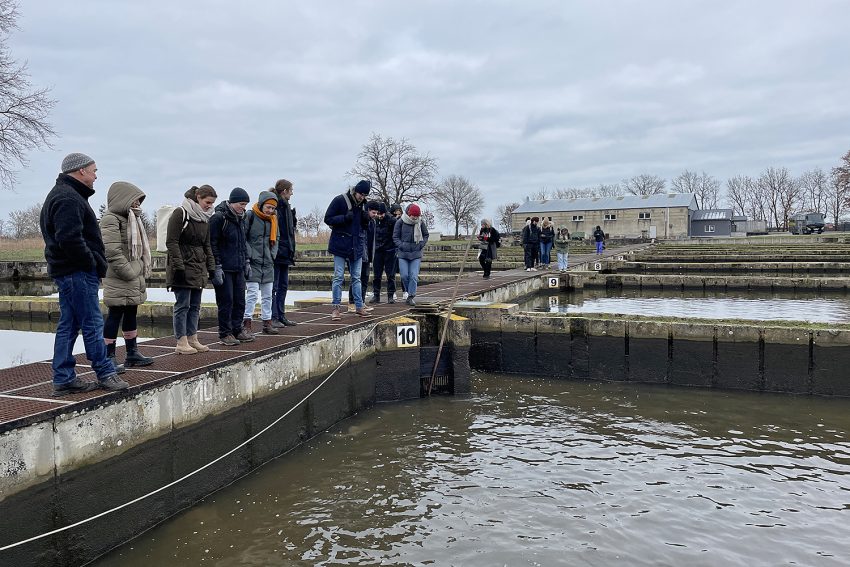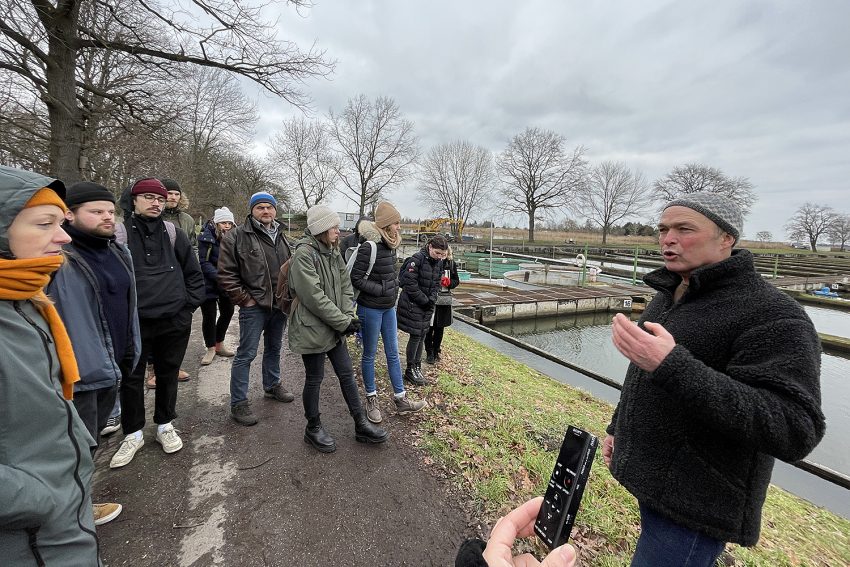Excursion to cold and wet fishes Human-environment relations in transition
Conflicts, competition and cooperation between animal and human actors were observed on a concrete example – students from the Faculty of Humanities and Education at Technische Universität Braunschweig and students from Leibniz University Hannover were able to do this on an excursion to Torgau. On the initiative of Siran Liang, doctoral student at the Institute of Geosystems and Bioindication at TU Braunschweig, and Karolin Kautzschmann, research associate at the Institute for Economic and Cultural Geography at Leibniz University Hannover, they visited a fishing company and learned how dynamic human-environment relations influence production processes.

Among other things, the students visited the fishery’s holding tanks. Photo credit: Siran Liang/TU Braunschweig
Biodiversity and conservation of resources are two goals that people in western democracies can quickly agree on. But when it comes to concrete targets, it is not only economic interests that are pitted against ecological interests. In many cases, individual protection objectives compete with each other within environmental policy, and there are fierce disputes about their priority. In addition to different values, there are also power imbalances and social inequality.
As part of the seminar “Environmental Humanities – Digital Hub”, students from TU Braunschweig together with Geography students from the seminar “Geographien Ungleicher Entwicklungen” (Geographies of Unequal Developments) at Leibniz University Hannover interviewed Thomas Plate, the manager of a fishing company in Torgau, about how economic and ecological conflicts of interest shape his work. Afterwards, with the support of the lecturers Siran Liang and Karolin Kautzschmann, they organised an excursion to his fishing company to analyse the human-environment relationship as well as structures and processes of local and global inequalities on site.
During the day excursion, the students visited the fishing company and learned about the effects that human-environment relationships can have on production processes. One example is the relationship between humans, farmed fish and the cormorant. The cormorant, a protected bird species, eats the smaller fish from freshwater fisheries. Only from a weight of about 500 grams are they safe from him. As a result, farms like the one in Torgau have to buy fish of this size from Poland and then grow them to “edible” size.
Global problems perceptible at local level
Global problems such as climate change also influence the fishing industry. It causes ponds to dry out and promotes the growth of algae. In addition, regional fishing companies have to compete with larger competitors. The sea fishing industry with its big lobby is able to sell salmon from a great distance at a price that local fisheries cannot compete with.
Finally, the students discussed with Thomas Plate and Jan Schöne, volunteer manager of a NABU nature conservation station, how sustainable and social business is possible. “Reconciling nature conservation, climate change, profit, bureaucracy and the needs of the clientele is a particularly big challenge,” the students summed up after the visit to the Torgau fishery.
Text: Siran Liang und Karolin Kautzschmann

